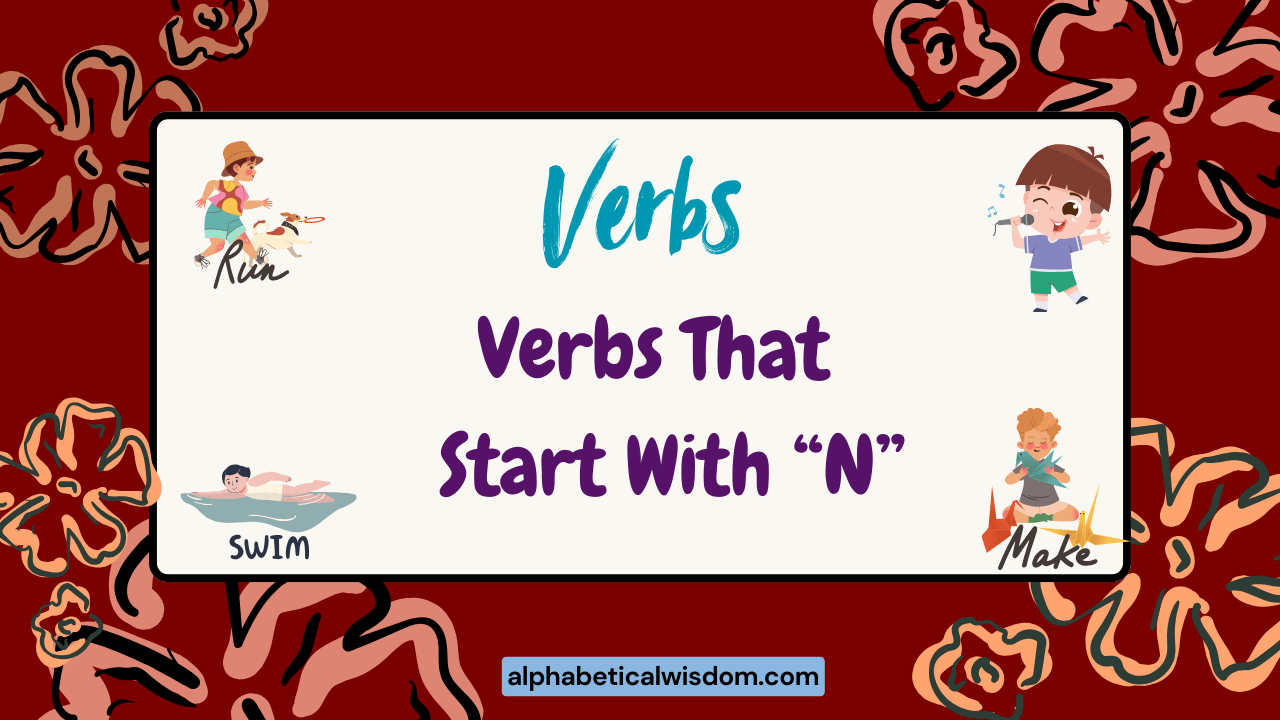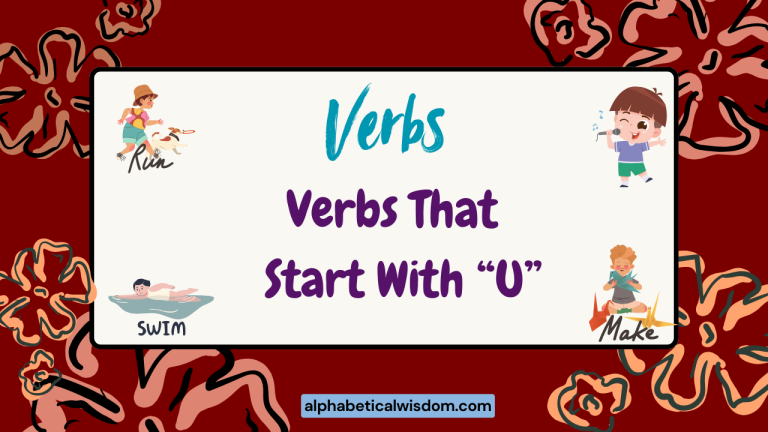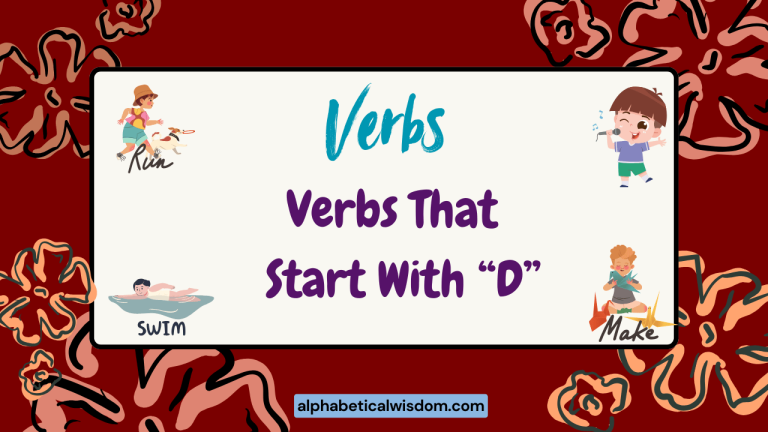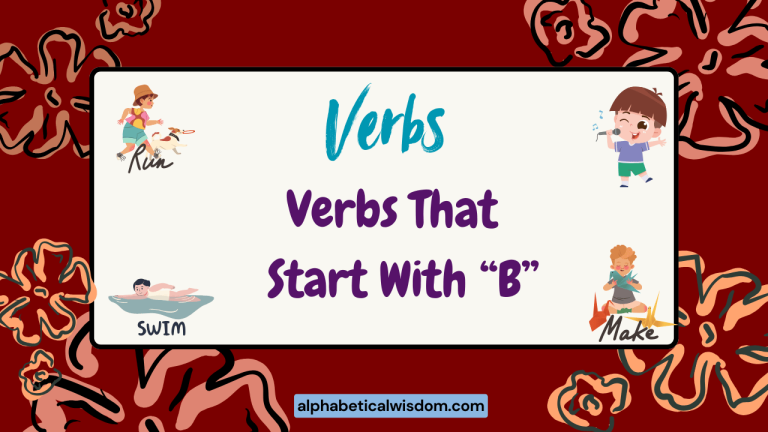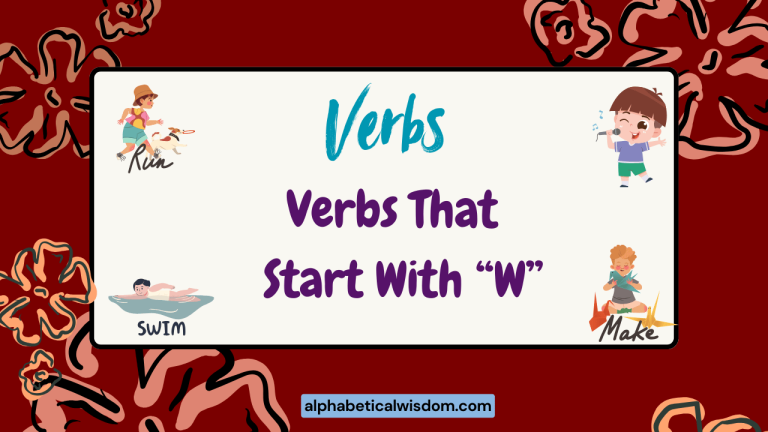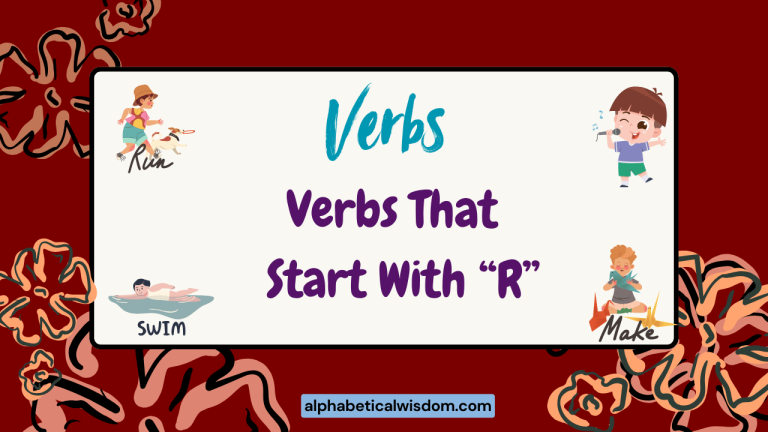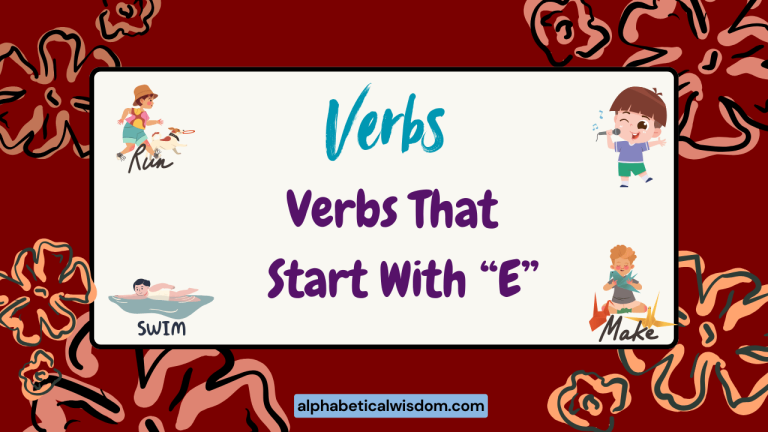Verbs That Start With N: A Comprehensive Grammar Guide
Understanding verbs is crucial for constructing grammatically correct and meaningful sentences in English. This article focuses specifically on verbs that begin with the letter “N,” exploring their diverse meanings, forms, and usage.
Mastering these verbs will significantly enhance your vocabulary and improve your ability to express yourself clearly and effectively. This guide is designed for English language learners of all levels, from beginners seeking to expand their verb repertoire to advanced speakers aiming to refine their understanding of nuanced verb usage.
Table of Contents
- Introduction
- Definition of Verbs Starting with N
- Structural Breakdown of Verbs
- Types and Categories of Verbs Starting with N
- Examples of Verbs Starting with N
- Usage Rules for Verbs Starting with N
- Common Mistakes with Verbs Starting with N
- Practice Exercises
- Advanced Topics
- FAQ
- Conclusion
Definition of Verbs Starting with N
A verb is a word that describes an action, occurrence, or state of being. Verbs that start with the letter “N” are no different; they function as the engine of a sentence, driving the action or describing a condition.
These verbs, like all verbs, can be classified based on their function, transitivity, and whether they are regular or irregular. Understanding these classifications helps in using them correctly and effectively.
Verbs starting with ‘N’ can express a wide range of meanings, from the physical act of navigating a ship to the mental process of needing something. They can also describe the process of nurturing growth or the act of noticing a detail. Their versatility makes them essential components of the English language.
Structural Breakdown of Verbs
Verbs in English have several forms, including the base form, past tense, past participle, and present participle (or gerund). Regular verbs form their past tense and past participle by adding “-ed” to the base form.
Irregular verbs, however, have unique forms that must be memorized. The present participle is formed by adding “-ing” to the base form.
Understanding the structure of verbs is essential for proper conjugation and sentence construction. For example, the verb “need” is a regular verb, so its past tense is “needed.” However, a hypothetical verb like “nake” (if it existed) might be irregular and have a past tense like “noke” or “naken” (though this is purely for illustrative purposes).
Knowing these patterns helps in predicting and understanding verb forms.
Types and Categories of Verbs Starting with N
Action Verbs
Action verbs describe specific actions that a subject performs. These actions can be physical or mental. Verbs starting with ‘N’ that fall into this category include navigate, nudge, and nail.
Stative Verbs
Stative verbs describe a state of being, a condition, or a mental process rather than an action. Examples of stative verbs starting with ‘N’ include need, notice, and sometimes name (when referring to a state of being called something).
Transitive Verbs
Transitive verbs require a direct object to complete their meaning. The action of the verb is transferred to the object. Examples of transitive verbs starting with ‘N’ include name (He named the dog Max), need (I need water), and narrate (She narrated the story).
Intransitive Verbs
Intransitive verbs do not require a direct object. The action of the verb is complete in itself. Examples of intransitive verbs starting with ‘N’ include nod (He nodded in agreement) and nap (The baby napped). While some verbs can be both transitive and intransitive, their usage determines their classification in a specific sentence.
Regular Verbs
Regular verbs form their past tense and past participle by adding “-ed” or “-d” to the base form. Examples of regular verbs starting with ‘N’ include notice (noticed), name (named), and nudge (nudged).
Irregular Verbs
Irregular verbs do not follow the standard “-ed” rule for forming the past tense and past participle. They have unique forms that must be memorized.
There are fewer irregular verbs starting with “N” compared to other letters. One example is *kneel* (knelt).
Examples of Verbs Starting with N
Below are several examples of verbs starting with “N,” categorized for clarity. Each section provides a list of sentences demonstrating the verb’s usage in different contexts.
Narrate
The verb “narrate” means to tell a story or describe a series of events. Understanding its usage is crucial for clear and engaging communication.
The following table provides examples of the verb ‘narrate’ used in different contexts.
| Sentence | Tense |
|---|---|
| She narrates stories to children every week. | Present Simple |
| He narrated the entire journey in vivid detail. | Past Simple |
| They are narrating the documentary about wildlife. | Present Continuous |
| The author has narrated his own audiobook. | Present Perfect |
| By the time we arrived, she had already narrated half the play. | Past Perfect |
| The film will narrate the events leading up to the revolution. | Future Simple |
| He is going to narrate the story from a different perspective. | Future (going to) |
| She was narrating the events as they unfolded. | Past Continuous |
| The teacher asked him to narrate his experience. | Infinitive |
| Narrating the story was a challenging but rewarding experience. | Gerund |
| Having narrated several books, he became a sought-after voice artist. | Perfect Participle |
| If he narrated the story, it would be more engaging. | Conditional |
| If she had narrated the story, it would have been a success. | Past Conditional |
| The events are narrated from the protagonist’s point of view. | Passive Voice |
| The story is being narrated by a famous actor. | Passive Continuous |
| He should narrate the story with more enthusiasm. | Modal Verb (should) |
| She can narrate in multiple languages. | Modal Verb (can) |
| They must narrate the facts accurately. | Modal Verb (must) |
| He might narrate the tale differently next time. | Modal Verb (might) |
| The book was narrated in a captivating manner. | Past Passive |
| The director wanted the actor to narrate with emotion. | Infinitive |
| He is known for narrating complex topics simply. | Gerund |
| Narrating the historical events accurately is crucial. | Gerund |
| She had been narrating for hours before the break. | Past Perfect Continuous |
Navigate
The verb “navigate” means to find one’s way, often through a complex environment, or to manage a difficult situation. The following table provides examples of the verb ‘navigate’ used in different contexts.
| Sentence | Tense |
|---|---|
| Sailors navigate the seas using charts and compasses. | Present Simple |
| The captain navigated the ship through the storm. | Past Simple |
| We are navigating the website to find the information. | Present Continuous |
| He has navigated many challenging situations in his career. | Present Perfect |
| By the time they reached the shore, they had navigated treacherous waters. | Past Perfect |
| The plane will navigate through the mountains. | Future Simple |
| She is going to navigate the company through the crisis. | Future (going to) |
| They were navigating the maze with difficulty. | Past Continuous |
| He needs to navigate the political landscape carefully. | Infinitive |
| Navigating the city streets can be confusing for tourists. | Gerund |
| Having navigated the bureaucracy, she finally got her permit. | Perfect Participle |
| If he navigated more cautiously, he wouldn’t get lost. | Conditional |
| If she had navigated the market better, she would have succeeded. | Past Conditional |
| The ship is navigated by a skilled crew. | Passive Voice |
| The website is being navigated by users from around the world. | Passive Continuous |
| You should navigate the menu to find the right option. | Modal Verb (should) |
| A good leader can navigate complex situations. | Modal Verb (can) |
| Pilots must navigate precisely to stay on course. | Modal Verb (must) |
| He might navigate the river using a map. | Modal Verb (might) |
| The boat was navigated skillfully through the storm. | Past Passive |
| The company needs to navigate the changes in regulation. | Infinitive |
| Navigating unfamiliar terrains requires expertise. | Gerund |
| She is adept at navigating social situations. | Gerund |
| They had been navigating the legal system for years. | Past Perfect Continuous |
Need
The verb “need” expresses requirement or necessity. It can be used as both a main verb and a modal auxiliary verb.
Understanding its different uses is important for correct grammar. The following table provides examples of the verb ‘need’ used in different contexts.
| Sentence | Tense |
|---|---|
| I need coffee to wake up in the morning. | Present Simple |
| He needed help with his homework. | Past Simple |
| They are needing assistance with the project. (Less common, but grammatically correct) | Present Continuous |
| She has needed a vacation for a long time. | Present Perfect |
| By the time we arrived, they had already needed our support. | Past Perfect |
| You will need a passport to travel abroad. | Future Simple |
| They are going to need more resources to finish the task. | Future (going to) |
| He was needing a break from the intense work. (Less common, but grammatically correct) | Past Continuous |
| We need to improve our communication skills. | Infinitive |
| Needing help is not a sign of weakness. | Gerund |
| Having needed assistance before, she knew where to turn. | Perfect Participle |
| If I needed advice, I would ask him. | Conditional |
| If she had needed money, she would have asked. | Past Conditional |
| The car needs to be repaired. | Passive Voice |
| The project is needing more attention. (Less common, but grammatically correct) | Passive Continuous |
| You need to need to focus more on your studies. | Modal Verb (need to) |
| They need to need to be more organized. | Modal Verb (need to) |
| He need not need to worry about the future. | Modal Verb (need not) |
| She need not need to be concerned about the outcome. | Modal Verb (need not) |
| The report was needed urgently. | Past Passive |
| We need to need to address this issue immediately. | Infinitive |
| Needing constant validation can be tiring. | Gerund |
| The company is needing innovative solutions. | Present Continuous |
| She has been needing a new laptop for months. | Present Perfect Continuous |
Notice
The verb “notice” means to become aware of something. It often implies a brief or sudden observation.
The following table provides examples of the verb ‘notice’ used in different contexts.
| Sentence | Tense |
|---|---|
| I notice the change in the weather every morning. | Present Simple |
| He noticed a strange sound outside. | Past Simple |
| They are noticing an increase in customer complaints. | Present Continuous |
| She has noticed a pattern in the data. | Present Perfect |
| By the time I pointed it out, he had already noticed the mistake. | Past Perfect |
| You will notice the difference immediately. | Future Simple |
| We are going to notice the impact of these changes. | Future (going to) |
| She was noticing subtle changes in his behavior. | Past Continuous |
| It’s important to notice the details. | Infinitive |
| Noticing the problem early can prevent bigger issues. | Gerund |
| Having noticed the discrepancy, he reported it immediately. | Perfect Participle |
| If you noticed anything unusual, please let me know. | Conditional |
| If she had noticed the error earlier, it could have been avoided. | Past Conditional |
| The error was noticed by the editor. | Passive Voice |
| The changes are being noticed by everyone. | Passive Continuous |
| You should notice the signs of fatigue. | Modal Verb (should) |
| One can notice the difference in quality easily. | Modal Verb (can) |
| Observers must notice and report any suspicious activity. | Modal Verb (must) |
| Someone might notice the missing item. | Modal Verb (might) |
| The issue was noticed during the audit. | Past Passive |
| They want people to notice the improvements. | Infinitive |
| Noticing small details is part of his job. | Gerund |
| He is skilled at noticing subtle changes in the market. | Gerund |
| She had been noticing the same car parked outside for days. | Past Perfect Continuous |
Nurture
The verb “nurture” means to care for and protect someone or something while they are growing. It often refers to the upbringing of children or the cultivation of plants or ideas.
The following table provides examples of the verb ‘nurture’ used in different contexts.
| Sentence | Tense |
|---|---|
| Parents nurture their children with love and care. | Present Simple |
| The gardener nurtured the plants carefully. | Past Simple |
| They are nurturing young talent in the company. | Present Continuous |
| She has nurtured a successful career. | Present Perfect |
| By the time he became CEO, he had already nurtured many promising projects. | Past Perfect |
| We will nurture the seeds of innovation. | Future Simple |
| They are going to nurture the partnership with the new client. | Future (going to) |
| He was nurturing his passion for music. | Past Continuous |
| It is important to nurture healthy relationships. | Infinitive |
| Nurturing creativity is essential for innovation. | Gerund |
| Having nurtured the plant from a seed, she was proud of its growth. | Perfect Participle |
| If you nurtured your talent, you could achieve great things. | Conditional |
| If she had nurtured her relationships, she would have had more support. | Past Conditional |
| The plants are nurtured in a greenhouse. | Passive Voice |
| The new employees are being nurtured by experienced mentors. | Passive Continuous |
| Schools should nurture the talents of their students. | Modal Verb (should) |
| Parents can nurture their children’s interests. | Modal Verb (can) |
| Leaders must nurture a positive work environment. | Modal Verb (must) |
| A supportive community might nurture new businesses. | Modal Verb (might) |
| The project was nurtured with great care. | Past Passive |
| The company aims to nurture innovation and creativity. | Infinitive |
| Nurturing a positive mindset is crucial for success. | Gerund |
| She is dedicated to nurturing young artists. | Gerund |
| The team had been nurturing the project for years before it launched. | Past Perfect Continuous |
Usage Rules for Verbs Starting with N
Verbs starting with “N” follow the same general rules as all English verbs regarding subject-verb agreement, tense, and aspect. Here are some key points to remember:
- Subject-Verb Agreement: The verb must agree in number with its subject. For example, “He needs help” (singular) versus “They need help” (plural).
- Tense: Use the correct tense to indicate when the action takes place. “I noticed the change yesterday” (past tense) versus “I notice the change every day” (present tense).
- Aspect: Use the correct aspect (simple, continuous, perfect) to indicate the duration or completion of the action. “She is narrating the story now” (present continuous) versus “She has narrated the story many times” (present perfect).
- Transitivity: Ensure transitive verbs have a direct object. “He named his dog Max” (dog is the direct object). With intransitive verbs, avoid using a direct object. “They napped” (no object needed).
Pay close attention to the context to choose the most appropriate verb and form to convey your intended meaning accurately.
Common Mistakes with Verbs Starting with N
Learners often make mistakes with verbs starting with “N,” particularly concerning tense, transitivity, and the use of modal verbs. Here are some common errors and their corrections:
| Incorrect | Correct | Explanation |
|---|---|---|
| I need to went to the store. | I need to go to the store. | After “to,” use the base form of the verb. |
| He narrated to the story. | He narrated the story. | “Narrate” is a transitive verb and requires a direct object without the preposition “to.” |
| She must to navigate the issue. | She must navigate the issue. | Modal verbs are followed by the base form of the verb without “to.” |
| They are need help. | They need help. or They are needing help. | The verb “need” requires a helping verb (like “are”) when used in the continuous tense, although the continuous form is less common. |
| I not notice the difference. | I did not notice the difference. | Use “do/does/did + not” to form the negative of most verbs in the present and past simple tenses. |
Being aware of these common pitfalls can help you avoid errors and use verbs starting with “N” correctly.
Practice Exercises
Test your understanding of verbs starting with “N” with these exercises. Fill in the blanks with the correct form of the verb in parentheses.
- The captain _________ the ship through the fog. (navigate)
- I _________ a new computer for my work. (need)
- She _________ the story with great enthusiasm. (narrate)
- Did you _________ the change in the weather? (notice)
- Parents _________ their children’s growth and development. (nurture)
- He _________ in agreement when I suggested the idea. (nod)
- The baby _________ peacefully in her crib. (nap)
- They _________ their son after his grandfather. (name)
- She _________ the nail into the wood with a hammer. (nail)
- The teacher _________ him to pay attention in class. (nudge)
Answer Key:
- navigated
- need
- narrated
- notice
- nurture
- nodded
- napped
- named
- nailed
- nudged
Exercise 2: Choose the correct verb form:
- They (need / needs) help with their project.
- She (narrated / narrates) stories to children every week.
- I (am noticing / notice) a change in his behavior.
- He (navigated / navigates) the boat skillfully.
- Parents (nurture / nurtures) their children with love.
- We (nodded / nod) in agreement with the proposal.
- The baby (napped / naps) soundly in the afternoon.
- They (named / name) their dog Buddy.
- He (nailed / nail) the picture to the wall.
- She (nudged / nudge) him to wake up.
Answer Key:
- need
- narrates
- am noticing
- navigated
- nurture
- nodded
- naps
- named
- nailed
- nudged
Exercise 3: Rewrite the sentences using the passive voice:
- The author narrated the story.
- The captain navigated the ship.
- The company needs more resources.
- Everyone noticed the changes.
- The parents nurture their children.
Answer Key:
- The story was narrated by the author.
- The ship was navigated by the captain.
- More resources are needed by the company.
- The changes were noticed by everyone.
- The children are nurtured by their parents.
Advanced Topics
For advanced learners, consider exploring the nuances of verbs starting with “N” in more complex grammatical structures, such as:
- Subjunctive mood: Expressing wishes, suggestions, or hypothetical situations.
- Causative verbs: Using verbs like “need” to indicate someone causing an action to happen. For example, “I need him to fix the car.”
- Phrasal verbs: Combining verbs starting with “N” with prepositions or adverbs to create new meanings. (While less common, examples could be constructed).
Further research into these areas will deepen your understanding and mastery of English verbs.
FAQ
- Are all verbs starting with “N” action verbs?
No, some are stative verbs, describing states of being or mental processes. - How can I tell if a verb starting with “N” is transitive or intransitive?
Check if the verb takes a direct object. If it does, it’s transitive; otherwise, it’s intransitive. - Is “need” always a regular verb?
Yes, “need” is a regular verb. Its past tense and past participle are “needed.” - Can I use the present continuous tense with stative verbs like “need”?
While less common, it is grammatically correct. It typically emphasizes a temporary state or a current need. - What is the difference between “notice” and “observe”?
“Notice” implies a brief or sudden awareness, while “observe” suggests a more deliberate and sustained attention. - How do I form the negative of verbs starting with “N” in the simple present tense?
Use “do not” (don’t) or “does not” (doesn’t) before the base form of the verb. For example, “I do not need help.” - What are some common phrasal verbs using verbs starting with ‘N’?
While not as common as with other letters, one could potentially construct phrasal verbs. For example, “narrow down” (to reduce options) or “name after” (to give someone a name in honor of another person). - How do auxiliary or modal verbs interact with verbs starting with ‘N’?
Auxiliary verbs like ‘be’, ‘do’, and ‘have’ help to form different tenses and aspects of verbs starting with ‘N’. Modal verbs such as ‘can’, ‘should’, and ‘must’ add different shades of meaning, such as ability, obligation, or possibility. - Can a verb starting with “N” be used as a noun?
Yes, verbs can sometimes be used as nouns (gerunds). For example, “Navigating the river was challenging.” - How do I choose the correct tense when using verbs starting with “N”?
Consider the time frame in which the action occurred or will occur. Use the past tense for completed actions, the present tense for current or habitual actions, and the future tense for actions that will happen in the future. - What is the difference between ‘name’ and ‘nominate’?
‘Name’ means to give a name to someone or something, while ‘nominate’ means to formally suggest someone for an award or position. - What is the difference between ‘neglect’ and ‘nurture’?
‘Neglect’ means to fail to care for someone or something properly, while ‘nurture’ means to care for and protect someone or something while they are growing. They are antonyms.
Conclusion
Mastering verbs that start with the letter “N” is an important step in expanding your English vocabulary and improving your grammatical accuracy. By understanding their various functions, forms, and usage rules, you can communicate more effectively and confidently.
Remember to practice regularly, pay attention to context, and be mindful of common mistakes. Continue to explore and refine your knowledge of verbs to enhance your overall language proficiency.
This comprehensive guide has provided a detailed overview of verbs starting with “N.” By studying the definitions, examples, and exercises, you are well-equipped to use these verbs correctly and confidently in your writing and speaking. Keep practicing and expanding your vocabulary to achieve fluency in English.
